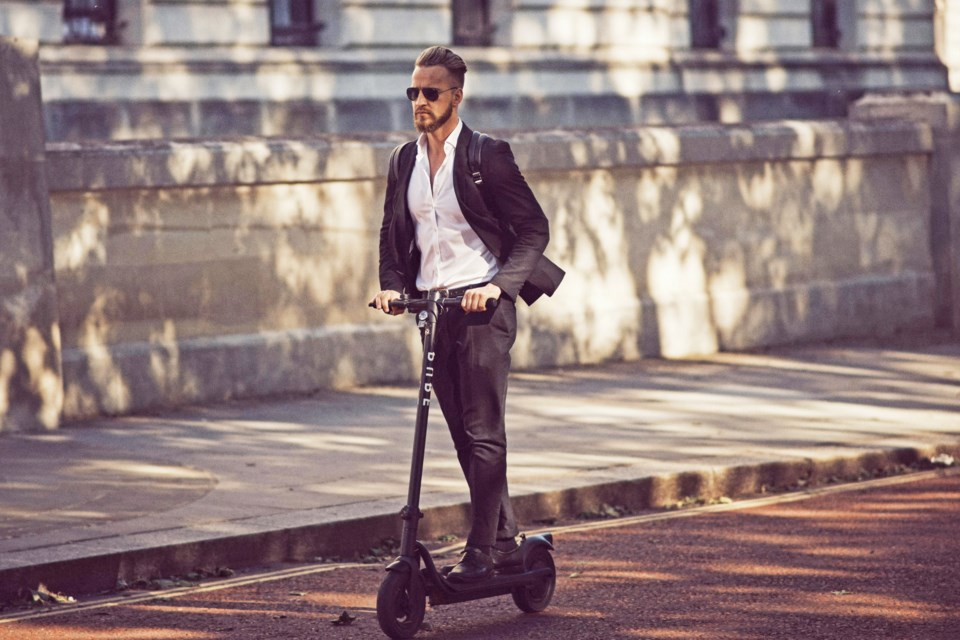Bradford is looking at ways to make it easier for residents to scoot around town.
Based on a report from Deputy CAO Mahesh Ramdeo, council has agreed to join Ontario's electric kick scooter pilot project. This paves the way for a company to operate a shared e-scooter/e-bike program, as well as the updating of the traffic bylaw as necessary.
“I’m absolutely in favour of this,” Mayor James Leduc said of taking those first steps, noting he’s seen how it can be done right in other municipalities.
Ramdeo’s report suggests an e-scooter/e-bike sharing program (potentially similar to Lime scooters or Bike Share Toronto) could encourage people to use alternate transportation options, especially for short trips and connections to GO or Linx Transit, which could help alleviate traffic congestion and reduce pressure on local transit.
“We need to be a little bit smart about this. We want to encourage active transportation,” Ward 4 Coun. Joseph Giordano said, adding he regularly uses an e-scooter to get around town.
He noted that if council is going to encourage greater use of those micromobility vehicles, then they should be working with schools to ensure proper storage options to prevent theft, and the town’s definitions need to be broad enough to cover other options such as electric unicycles.
While the town’s traffic bylaw already permits e-bikes, it makes no mention of e-scooters, according to Ramdeo’s report, which goes on to explain that permitting e-scooters would require the town to join the province’s pilot program and provide related data as the province requests.
Ward 3 Coun. Ben Verkaik cautioned that e-scooters “don’t seem to be the safest form of transportation,” which was echoed by Ward 7 Coun. Peter Dykie who said he already sees e-scooters dangerously “flying” past shops in the downtown.
In response, Ramdeo said the town is simply trying to meet the existing local demand, while Vanessa Morum, the town’s manager of legal, risk management and procurement, assured councillors that under the provincial pilot, e-scooters are not permitted on sidewalks.
Ward 6 Coun. Nickolas Harper asked about the potential liability of welcoming such a program to town, especially without any dedicated bicycle/scooter lanes.
Ramdeo said staff are currently working on a plan for an east-west transportation corridor in town and expect to provide a report in future, but when it comes to the downtown, he suggested people on bicycles and scooters will be redirected onto parallel side streets with lower speed limits.
For further context, Morum explained the town is always exposed to some risk for legal claims as a road authority, but noted dedicated space for bicycles and scooters would help.
Deputy Mayor Raj Sandhu suggested the town should consider how any such program can generate revenue for the town, but also worried about the resources needed to actually enforce the related bylaws.
While corporate services director Brent Lee said he would need time to provide council with a detailed answer about enforcement, Ramdeo assured council staff will explore different permit options to bring in revenue and will report back to council if a provider does come forward.
The provincial government launched its Ontario-wide e-scooter pilot project with a regulation on Nov. 27, 2019, and the pilot is set to run from Jan. 1, 2020 to Nov. 27, 2029.
Under the pilot, e-scooters are limited to a motor with no more than 500 watts, a maximum speed of 24 kilometres per hour, and users are required to be age 16 or older.
Among other things, the e-scooter pilot mandates:
- users under 18 wear helmets
- e-scooters operated in the dark or within 30 minutes of dusk/dawn have front and rear lights
- e-scooters cannot be used to carry passengers or cargo, and cannot be used to tow other vehicles/people/devices
- riders stand to operate the e-scooters; seats are not permitted to be added
- e-scooters cannot be parked in the way of vehicles or pedestrians
- e-scooters cannot be modified to exceed power and/or speed limitations
As part of any potential program, Ramdeo’s report recommends geofencing to prevent use in prohibited areas, designating storage locations/parking areas, a permit fee and a process to retrieve abandoned units.
